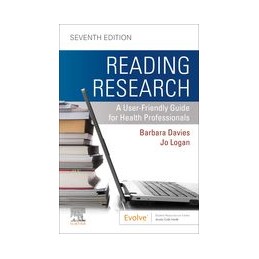- Reduced price

Order to parcel locker

easy pay


 Delivery policy
Delivery policy
Choose Paczkomat Inpost, Orlen Paczka, DHL, DPD or Poczta Polska. Click for more details
 Security policy
Security policy
Pay with a quick bank transfer, payment card or cash on delivery. Click for more details
 Return policy
Return policy
If you are a consumer, you can return the goods within 14 days. Click for more details
Learn how to evaluate and apply health sciences research with this beginners guide! Reading Research:: A User-Friendly Guide for Health Professionals, 7th Edition provides a clear introduction to reading and understanding research articles, with practical guidelines for implementing research into clinical practice. It describes how to interpret common research methods including qualitative, quantitative and mixed-method approaches, and explains how to find relevant, reliable research on the internet. Written by Barbara Davies and Jo Logan, both of whom are noted educators and research experts, this easy-to-use pocket guide is ideal for both students and health professionals.
Data sheet
1 Introduction
Why Read Research Articles?
Some Friendly Advice About Reading Research Articles
Check Out the Readers Companion Worksheets
2 Easy Steps for Reading Research
Title Abstract
Introduction
Theory Issues
Methods
Design
Part 1: Qualitative Design Methods
Rigour in Qualitative Studies
Sample and Setting
Data Collection
Data Analysis and Results
Part 2: Quantitative Design Methods
Experimental Designs
Non-Experimental Designs
Rigour in Quantitative Studies
Sample
Data Collection
How to Judge the Rigour of a Data Collection Tool
Sensitivity and Specificity
Data Analysis and Results
Descriptive Statistics
Inferential Statistics
Part 3: Mixed Methods Research
Mixed Methods Study Characteristics
Mixed Methods Data Collection and Analysis
Results and Discussion
A Final Suggestion: The Acknowledgements
3 Finding Interesting Research Results
Where and How to Start
Define Your Clinical Question
Steps in Constructing a PICO Chart
Search a Database for Relevant Research
Search Terms
How Far Back Should You Search?
Review Articles
How to Read the Fictional Forest Plot Depicting a Meta-Analysis
Appraising Reviews
Searching the Internet for Research Articles
Peer Review
A Cautionary Note About Predatory or Fake Journals on the Internet
How Will I Know If a Journal Is Fake?
Why Should I Be Concerned If the Paper Is Published in a Predatory Journal
Web Portals
Other Types of Databases
Keeping Up to Date
Social Media: Facebook
4 Using Research Results
Research Utilization
The Questions to Ask
Clinical Practice Guidelines
Appraisal of Guidelines for Research and Evaluation
Practice Guideline Websites
The Decision to Use Research Results
Gathering Support and Resources
Want to Learn More?
Bibliography
Glossary
Journals That Publish Peer-Reviewed Research
Worksheets
1. Qualitative Research: The Readers Companion Worksheet
2. Quantitative Research: The Readers Companion Worksheet
3. Mixed Methods Research: The Readers Companion
Worksheet
4. Systematic Reviews: The Readers Companion Worksheet
5. Using Research Results: The Readers Companion
Worksheet
